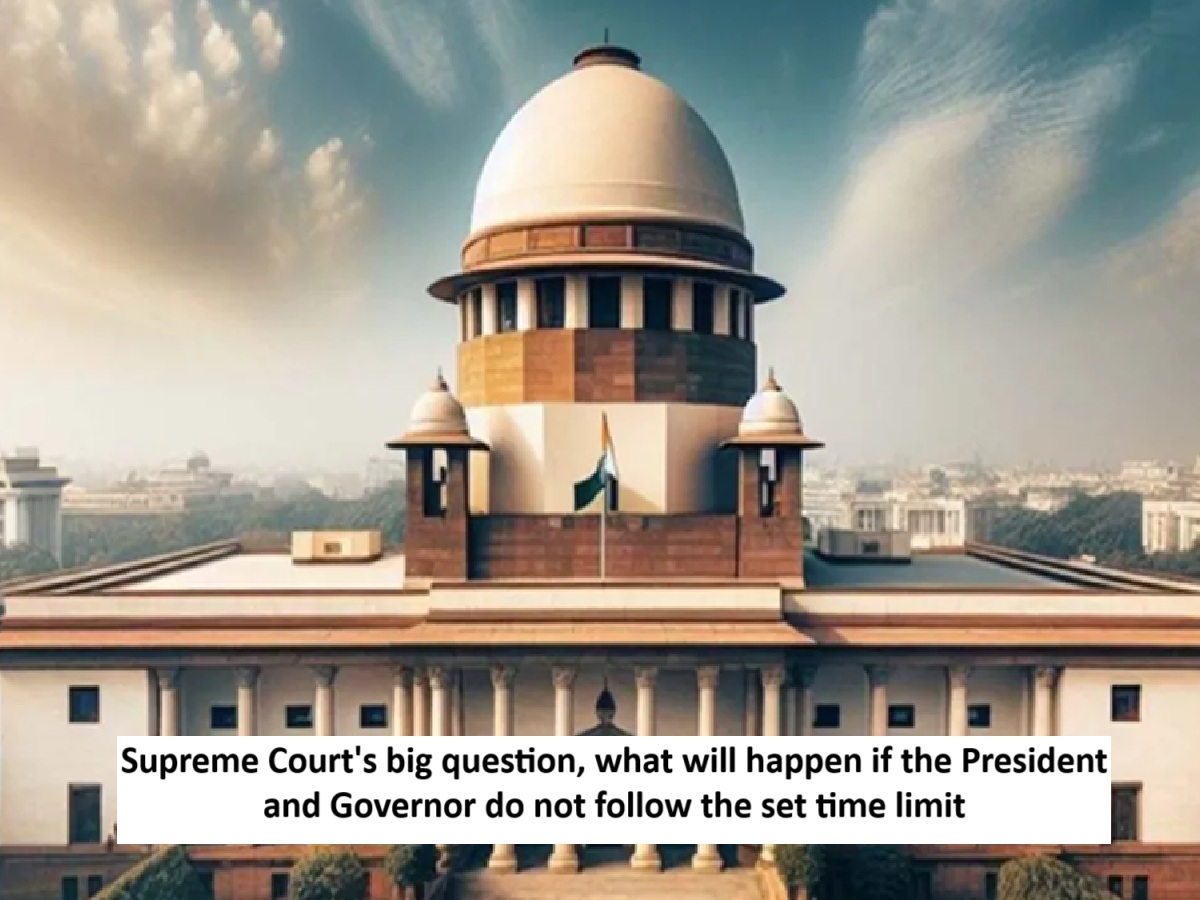
News Topical, Digital Desk : While hearing the issue of Presidential Reference, the Supreme Court expressed doubts on its own powers. It also questioned the time limit set for decision on bills and the automatic approval (deemed assent) given by the court if a decision is not taken within the stipulated time.
Supreme Court asked the question
During the hearing on Tuesday, the apex court asked advocate Abhishek Manu Singhvi, appearing for Tamil Nadu, who was in favour of setting a deadline for the Governor and the President to take a decision on the bill, what would happen if the deadline was not adhered to.
The court also clarified that it will only interpret constitutional questions in the Presidential Reference and will not go into individual cases. The debate will continue on Wednesday as well. A five-member Constitution Bench headed by Chief Justice BR Gavai is currently hearing the Presidential Reference in the Supreme Court.
On Tuesday, when senior advocate Abhishek Manu Singhvi, appearing for the Tamil Nadu government, justified the deemed assent by setting a time limit for the governor and the President and not taking a decision within that period, the court, expressing doubt on its own power, asked him several questions.
The court asked Singhvi what would happen if the timeline was not followed. If there was no action on the bills, could the court give deemed assent? Does the court have the right to give such an order under Article 142?
Justice Vikram Nath asked whether the court can consider the above three options by going into the jurisdiction of the Governor. Singhvi justified the time limit set by the court and said that where the Constitution is silent, the court can fill the void and give orders. He gave the example of the court's decision regarding the appointment of the Election Commissioner in this regard.
Singhvi said that the Governor cannot stop the bills indefinitely, if this happens then the bill will die. The Governor cannot be a super chief minister. The power to end the bill lies only with the cabinet. The Governor cannot do this. Even if a wrong bill is passed by majority, the court can consider it. This is the division of powers.
When Singhvi supported setting a timeline, the Chief Justice said that cases can be considered on the basis of different facts. How can there be a uniform timeline for all bills?
Singhvi said that the problem will not be solved if the matter is decided on a case-by-case basis. States will keep coming to the court every time the governor withholds assent. Senior advocate Kapil Sibal, appearing for the West Bengal government, also said that the governor does not have discretion over the bills.
The power of the Supreme Court to review any case
According to Pretr, the central government raised the question on this issue that any kind of judicial review can create constitutional imbalance and it will be considered against the principle of separation of powers.
On this, referring to the apex court's order in the Minerva Mills case, the bench said that judicial review is part of the basic structure of the Constitution. Even if the dispute is political, as long as it contains a constitutional question, the court cannot refuse to answer it.
Article 142 of the Constitution empowers the Supreme Court to pass any order necessary for doing complete justice in any case before it, even if it involves repealing existing laws or removing defects therein.
What is the issue of Presidential Reference
President Draupadi Murmu has sent 14 constitutional questions to the Supreme Court and sought its opinion. This is being called the Presidential Reference. The President has asked that when there is no time limit set in the Constitution for the Governor and the President to take a decision on the bills, can the court set a time limit?
It may be noted that a two-member bench of the Supreme Court in its decision given on April 8 in the Tamil Nadu case has set a time limit for the President and the Governor to take a decision on the bills passed by the State Assembly.
Ten bills passed by Tamil Nadu Assembly pending
Along with this, the court also declared ten bills passed by the Tamil Nadu Assembly, which were pending for a long time awaiting the Governor's approval, as approved by its order.
Opinion sought from the court on questions
It was only after this decision of the Supreme Court that the President sent a reference to the Supreme Court seeking opinion on 14 constitutional questions. The order of April 8 has not been directly mentioned in the reference, but all the questions on which the opinion has been sought from the court revolve around the provision given in the decision of April 8.
Read More: The world expects leadership from India, humans cannot be sacrificed for technology - Mohan Bhagwat
--Advertisement--

 Share
Share



